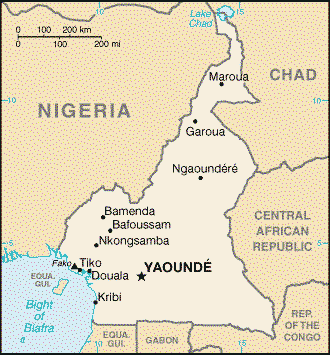 YAOUNDÉ – Native Bible translators have found themselves caught up as targets in politically-stirred hostilities in the Republic of Cameroon.
YAOUNDÉ – Native Bible translators have found themselves caught up as targets in politically-stirred hostilities in the Republic of Cameroon.
Cameroon is located on the west coast of Central Africa and is bordered by Nigeria to the northwest, Chad and the Central African Republic on the east, and Equatorial Guinea, Gabon, the People’s Republic of the Congo on the south.
Although Cameroon has generally experienced “relatively high political and social stability” the country has been experiencing rising political tension since mid-2017. Following World War I, Cameroon was a League of Nations mandate administered by the United Kingdom and France. Unlike many of its neighboring nations, Cameroon’s conflicts arise out of its Anglo/Franco history.
“Never before has tension around the Anglophone issue been so acute.” – ICGAccording to the International Crisis Group, “The Anglophone problem dates back to the independence period. A poorly conducted re-unification, based on centralization and assimilation, has led the Anglophone minority to feel politically and economically marginalized, and that their cultural differences are ignored.”
The crisis is typical of situations where minority groups seeking both integration or autonomy. Having lived through three months with no internet, six months of general strikes and one school year lost, many are now demanding federalism or secession. With the threats of Boko Haram in the north and interference from the Central African Republic in the east, Cameroon is sitting on the edge of instability prior to elections slated for later this year.
The tension has already escalated into a deadly conflict. Over 160,000 people have been displaced by the violence. Although Christians have not been primary targets, at least one Bible translator has been killed and several others have had their homes burned to the ground.
Wycliffe Associates has been working with local translators on 85 projects prior to tensions turning into violence. Nearly 20 of the projects have been hindered or stopped completely because of armed attacks that have caused the translators to flee to safety, leaving their homes, possessions, translation work, and supplies behind.
Referencing the impact on the translation work, a spokesman for Wycliffe said, “There is just a huge disruption to the whole family of Bible translation projects that are going on. Even though it’s only affecting 20 percent of them, 20 percent is a pretty large number when it’s your brothers and sisters in Christ.”
Wycliffe is trying to locate the translators, most of whom have retreated into the bush and are surviving by hunting and subsisting on the land. Once found, Wycliffe is bringing them to safety, which is their first priority, providing counseling, and, if they wish, returning them to translation work.
Wycliffe has requested prayer “for God to draw near in comfort to those who have lost possessions and loved ones in this surge of violence. Pray urgently for true peace in Cameroon. And ask God to make a way for Bible translation efforts in western Cameroon to resume for the spread of the Gospel.”
Sources:
- Mission Network News, Bible translators among those killed, forced to flee violence in Cameroon
- The Guardian, ‘I don’t know where my family is’: Cameroon’s refugees flee brutality
- International Crisis Group, Cameroon’s Anglophone Crisis: Dialogue Remains the Only Viable Solution
- Wikipedia, Cameroon
Image Source:
- By Rei-artur pt en Rei-artur blog [GFDL, CC-BY-SA-3.0 or CC BY-SA 2.5], via Wikimedia Commons




